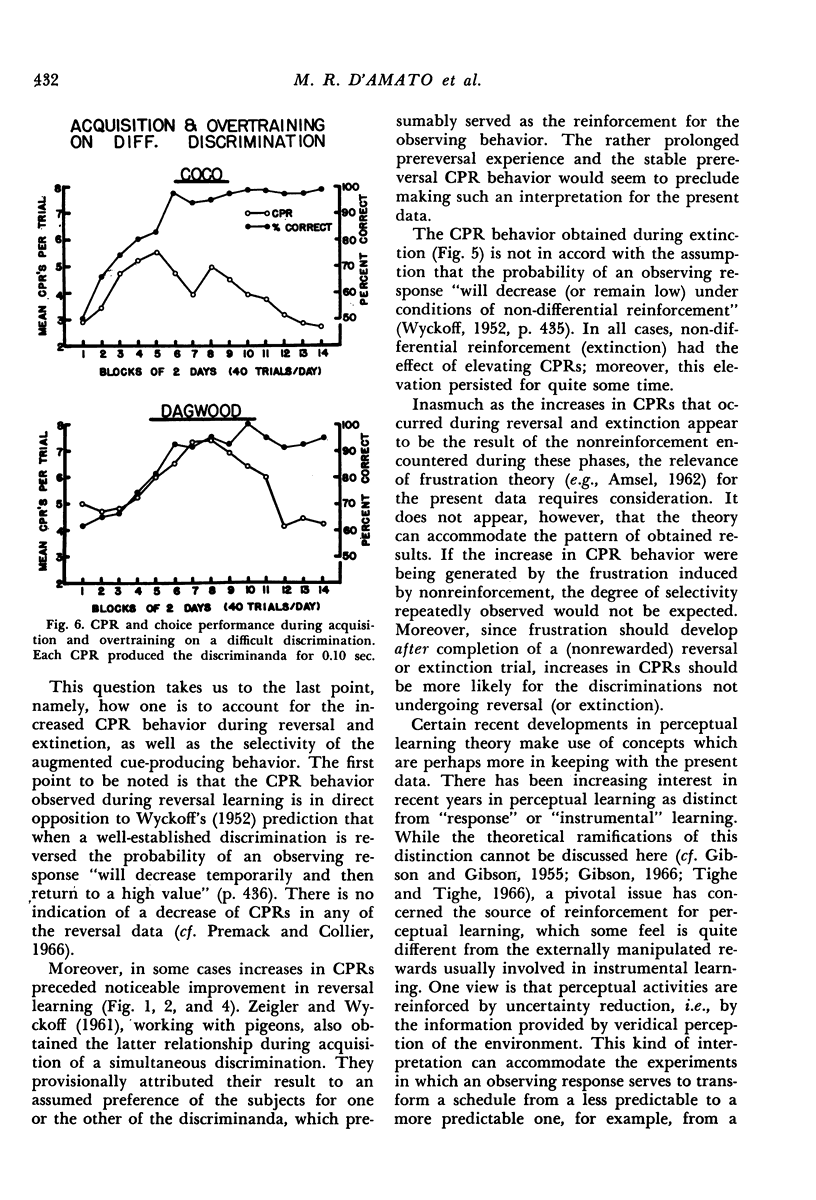Abstract
In a two-choice discrimination situation, a cue-producing response produced the discriminanda for 0.05 sec. The cue-producing responses beyond those normally necessary to identify the discriminanda thus provided only redundant information. Two of the four Capuchin monkeys studied showed a large increase in cue-producing responses during reversal learning and extinction, and they reversed much faster than the two whose cue-producing responses showed little increase. During acquisition of a difficult discrimination, the cue-producing responses of the first two subjects reached a high level and during overtraining gradually reduced to their initial low level. The results were related to Wyckoff's theory of observing behavior and to the notions of uncertainty, reduction, and lack of information as extensions of the concepts of reinforcement and motivation.
Full text
PDF








Selected References
These references are in PubMed. This may not be the complete list of references from this article.
- AMSEL A. Frustrative nonreward in partial reinforcement and discrimination learning: some recent history and a theoretical extension. Psychol Rev. 1962 Jul;69:306–328. doi: 10.1037/h0046200. [DOI] [PubMed] [Google Scholar]
- Berlyne D. E. Curiosity and exploration. Science. 1966 Jul 1;153(3731):25–33. doi: 10.1126/science.153.3731.25. [DOI] [PubMed] [Google Scholar]
- D AMATO M. R. DIRECT PROGRAMMING OF MULTIPLE STIMULI--THE TAPE BLOCK READER. J Exp Anal Behav. 1965 Jul;8:230–230. doi: 10.1901/jeab.1965.8-230. [DOI] [PMC free article] [PubMed] [Google Scholar]
- GIBSON J. J., GIBSON E. J. Perceptual learning; differentiation or enrichment? Psychol Rev. 1955 Jan;62(1):32–41. doi: 10.1037/h0048826. [DOI] [PubMed] [Google Scholar]
- HOLLAND J. G. Human vigilance: the rate of observing an instrument is controlled by the schedule of signal detections. Science. 1958 Jul 11;128(3315):61–67. doi: 10.1126/science.128.3315.61. [DOI] [PubMed] [Google Scholar]
- Hendry D. P., Dillow P. V. Observing behavior during interval schedules. J Exp Anal Behav. 1966 Jul;9(4):337–349. doi: 10.1901/jeab.1966.9-337. [DOI] [PMC free article] [PubMed] [Google Scholar]
- KELLEHER R. T., RIDDLE W. C., COOK L. Observing responses in pigeons. J Exp Anal Behav. 1962 Jan;5:3–13. doi: 10.1901/jeab.1962.5-3. [DOI] [PMC free article] [PubMed] [Google Scholar]
- Mitchell K. M., Perkins N. P., Perkins C. C., Jr Conditions affecting acquisition of observing responses in the absence of differential reward. J Comp Physiol Psychol. 1965 Dec;60(3):435–437. doi: 10.1037/h0022578. [DOI] [PubMed] [Google Scholar]
- PROKASY W. F., Jr The acquisition of observing responses in the absence of differential external reinforcement. J Comp Physiol Psychol. 1956 Apr;49(2):131–134. doi: 10.1037/h0046740. [DOI] [PubMed] [Google Scholar]
- Tighe L. S., Tighe T. J. Discrimination learning: two views in historical perspective. Psychol Bull. 1966 Nov;66(5):353–370. doi: 10.1037/h0023873. [DOI] [PubMed] [Google Scholar]
- WYCKOFF L. B., Jr The role of observing responses in discrimination learning. Psychol Rev. 1952 Nov;59(6):431–442. doi: 10.1037/h0053932. [DOI] [PubMed] [Google Scholar]
- WYCKOFF L. B. Toward a quantitative theory of secondary reinforcement. Psychol Rev. 1959 Jan;66(1):68–78. doi: 10.1037/h0046882. [DOI] [PubMed] [Google Scholar]


